Peter Parley’s Juvenile Tales, revised edition; by Samuel Goodrich (Philadelpha: Charles Desilver, 1855)
-----
[frontispiece]
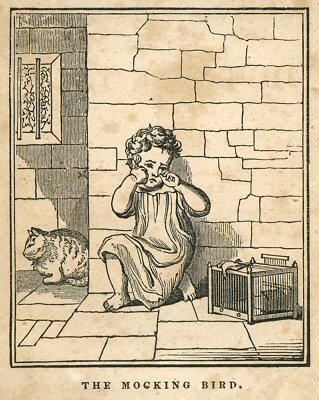
THE MOCKING BIRD.
-----
[title page]
JUVENILE TALES.
———
REVISED EDITION.
———
PHILADELPHIA:
CHARLES DESILVER,
No. 253 Market Street.
1855.
-----
[copyright page]
S. G. GOODRICH,
in the Clerk’s Office of the District Count of Massachusetts.
-----
[table of contents]
——
The Runaway … 7
The Bird’s Nest … 15
The Faithful Dog … 27
The Little Soldiers … 41
The Little Drummer … 53
The Little Prisoners … 66
The Mocking Bird … 81
The Mask … 93
The Little Sailor … 105
A Winter Story … 119
-----
p. 6
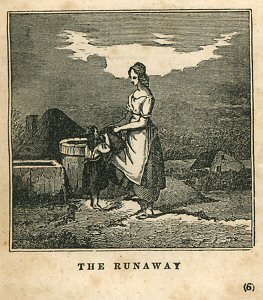
THE RUNAWAY.
-----
p. 7
THE RUNAWAY.
There was once a little girl whose name was Jane. Her mother went away one day, leaving Jane at home.
Before she went she told Jane to stay at home, and by no means to leave the house. This the little girl promised to do.
After her mother had been gone some time, Jane grew
-----
p. 8
weary of being alone, and went out doors to play. She then thought she would go down the lane and look for her mother.
She then thought she would go into the field and pick a few berries; and thus she wandered from one place to another, until she got lost.
She now ran this way and that, and was very much frightened. She tried to find the road that led home, but in vain. The more she tried to
-----
p. 9
find it, the further she went from it.
In this way she went to a great distance, and at length was so weary, and faint from thirst, that she could not walk. She lay down upon the ground, and thought she should die.
While she lay there, she could not help thinking how much better it would have been to have stayed at home, as her mother had told her to do. How did the little girl wish
-----
p. 10
she had not disobeyed her mother, and how did she resolve, if she ever got home again, to be obedient ever after.
While she was thinking of these things, she saw a woman at a well, drawing water near by. She crawled along to the woman and begged for some water. The woman gave her some, and then asked Jane why she was here, and in such distress. Jane then told her story.
-----
p. 11
The woman was kind hearted and took Jane home. It was now near night, but Jane begged the woman to show her the way home, and let her go. So the woman went a part of the way, and Jane, knowing the road, now set off alone.
She had got within about a mile of home, when it had got to be quite dark. She observed, however, a bright light toward her home. When she had gone a little further, she saw
-----
p. 12
that her home was in flames! She almost fell down upon the ground from dizziness and faintness. But she soon recovered, and ran forward with all her might. She reached the place, and saw the roof and sides of the house tumbling into a heap. The whole building was a sheet of flame.
In a short time some people came, and in a little while her poor mother arrived. It was found that in Jane’s ab-
-----
p. 13
sence a coal had fallen upon the floor, and as she was not there, the house had been set on fire, and burned to the ground.
Then Jane and her mother were without a home! What a dreadful consequence to follow from a little girl’s disobedience! For many years they were in sorrow and poverty, but Jane was ever after a good girl, and tried to atone for her fault.
-----
p. 14
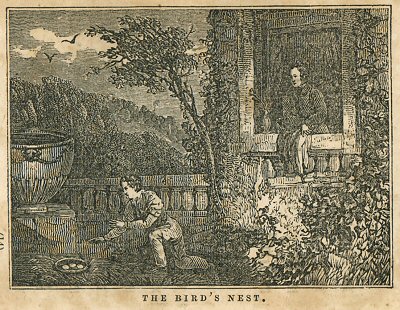
THE BIRD’S NEST.
-----
p. 15
THE BIRD’S NEST.
Well, if you will be good children, I will tell you of the Bird’s Nest.
There was once a gentleman who had a beautiful field near his house. On one of the trees in this field, for several successive years, a couple of robins built their nest.
When the winter had passed away, with its snow and
-----
p. 16
its dreary winds, and the green grass was already springing up in the meadows, the two robins were always heard on their favorite tree. Early in the morning, one of them would ascend to the highest bough, where he would pour forth his lively little song, and at evening he would again take his lofty seat, and repeat the same strain, with almost endless variations. While one of the birds was singing, the other
-----
p. 17
would sit in the tree and listen, and no doubt both of the birds understood the song perfectly well. I cannot tell exactly what the little songster said, but I will make a song, which I suppose may resemble that of the robin.
See! here it is! I hope you will learn it, and say it to your parents.
-----
p. 18
THE ROBIN’S SONG.
Cold Winter’s winds are passed away,Spring’s gentle breezes round us play;
The snow that pressed the sleeping flowers,
Is melted into gentle showers;
The ice that bound the laughing rills,
Is leaping joyous down the hills;
The violets now, with timid looks,
-----
p. 19
Are springing round the babbling brooks;
The fields resume their dress of green,
And pleasure brightens o’er the scene.
The happy hours, the happy hours,
Of opening leaves and blushing flowers,
Have come, and we may build our nest,
And sing our song, and thus be blest.
-----
p. 20
At early dawn, at gentle even,
We pour our thankful notes to heaven.
We sing to listening birds around,
And tell the pleasures we have found;
We mount the air with whistling wing,
We quench our thirst beside the spring;
We stole the dew drops from the rose,
And mid the flowers we seek repose.
-----
p. 21
The happy hours, the happy hours,
Of opening leaves and blushing flowers,
Have come, and we may build our nest,
And sing our song, and be at rest.
Something like the feelings here expressed, belong, perhaps, to the robin, when he sings his song in the spring.
Well, the birds I spoke of re-
-----
p. 22
turned as usual to their favorite tree, and built their nest. It was in the same place, where for four summers they had hatched their little ones. There were now four young robins in the nest, when three children chanced to be passing by.
Two of the children were girls, and one of them a boy. As the children approached the tree, the robins were alarmed for the safety of their little ones, and began to fly about and cry
-----
p. 23
in great agitation. The boy noticed this, and looking up to the tree, he discovered the nest. He took off his coat, and immediately ascended the tree to the place where it was. If you will look at the beginning of the book, you will see a picture of the scene.
Oh! how pitifully did the parents of the little robins cry and scream, round the cruel boy. But he heeded them not. He tore the nest from its place,
-----
p. 24
and handed it to the largest of the girls. She took it, and they carried it, with the four little robins, away.
The parents of the young robins followed the children, wailing as if their hearts would break. But it was all in vain. The children took the young robins into the house, and fed them, but in a few days the poor creatures all died. The two robins, their parents, after staying about a week around
-----
p. 25
the tree where they had built their nests and reared their young ones for four summers, left the spot and never returned to it again.
It is a cruel thing thus wantonly to rob the poor birds of their nests, and I hope none of my little readers will be so hard-hearted as to do so. It is delightful to see the birds building their nests, and feeding their young ones; they seem so industrious, and so fond of their
-----
p. 26
children, and so happy in their employment, that none but cruel or unfeeling persons can wish to turn their pleasure into mourning.
-----
p. 27
THE FAITHFUL DOG.
Very well, I will now tell you of Henry and his faithful dog.
There was once a young man, whose name was Henry; and he had a dog, whose name was Trusty. Henry was very fond of rambling in the woods, and climbing over the rocks and hills.
He always took his dog Trusty with him, for Trusty
-----
p. 28
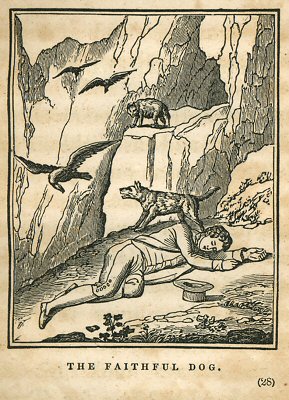
THE FAITHFUL DOG.
-----
p. 29
kept running and jumping about, barking at the quails and partridges, and hunting after squirrels and rabbits. It was delightful to see the dog, all life and activity, now dive into the bushes, and now scamper across an open field; now plash into a brook, and now climb up the rocks almost as swiftly as a bird! Then he would come bounding to his young master, lick his hand, jump up in his face, and
-----
p. 30
away he would run again, seeming as gay and happy as possible.
It was not, therefore, strange, that Henry always took Trusty with him in his rambles. The dog seemed like a friend to him, and he did not feel alone with Trusty by his side, when he was far away in the woods, or among the mountains.
One day Henry had gone far from his home. It was the beautiful season of spring. The
-----
p. 31
birds were singing on the trees; the flowers were blossoming in the meadows; the leaves were beginning to clothe the woods in green, and all around seemed lovely and pleasant.
Henry had set out early in the morning, and Trusty went barking and jumping by his side. He was already on the hill, when the sun was rising. It is delightful to be in the country in spring, when the sun comes up! Before the sun yet
-----
p. 32
appears, the robin is on the top of the tree singing his song; the larks, and blackbirds, and chipping birds, and martins, are all awake, and seem to be talking to each other as fast as they can. The grass is sparkling with dew, the valleys are white with mist, and the air is sweet with the smell of flowers.
I recommend it to all my little readers, when they happen to be in the country in spring, to go upon the hills, and see the
-----
p. 33
sun rise. But they should not go alone. They should get some person to go with them, and take care of them, lest they should meet with some bad accident.
Well, Henry went out early in the morning, as I said before. He went first to the top of a high hill, and looked down into a deep valley below it. The valley was covered with a white mist, which looked like a lake. It was exceedingly beautiful.
-----
p. 34
Henry paused and looked at it for a long time. Then he went along till he came to a river. It was a clear stream, and he could see the little fishes playing in it. Then he passed through a meadow, and thousands of flowers were opening their buds. And then he passed into the woods, and many birds were singing on the trees, and sailing in the air; and then he climbed up a steep mountain, and looked far and
-----
p. 35
wide over the meadows, and woods, and waters. He was standing on a high rock, from which he could see on one side many hills, and villages, and plains. On the other was a deep chasm, or valley, between the rocks, in which the eagles, crows, and owls, were flying about.
Henry was delighted with the scene. He could not be content till he had reached the top of the mountain, and he con-
-----
p. 36
tinued to climb higher and higher. At length he was on the very highest part of the mountain. His dog was by his side. He stood on a rock that overhung the steep. Suddenly his foot slipped, and he fell far down to the bottom of the rock! Alas, poor Henry! The fall was nearly fatal to him. His dog ran to him, but Henry was insensible. Poor Trusty barked as if his heart would break, but no one came to his help.
-----
p. 37
The day passed away, and evening came. The wild fox and vultures came around the body of poor Henry, but his faithful dog drove them away.
All night Trusty lay watching by his master, often barking and howling, and thus endeavoring to call some one to his aid. In the morning, some persons, in search of Henry, heard the voice of the dog, and were thus able to find his
-----
p. 38
master. He was carefully carried home, and after a long time he got well. Thus, you see, good faithful Trusty saved the life of his master.
Let this story, my little readers, furnish you with an example of faithfulness to a friend. Trusty was indeed only a dog. But Trusty did not leave his master and friend in misfortune. So, my little readers, may you be ever true to your friend, and if any of you
-----
p. 39
are at any time unfortunate or in danger, may you have some sure and kind friend to protect and save you.
-----
p. 40
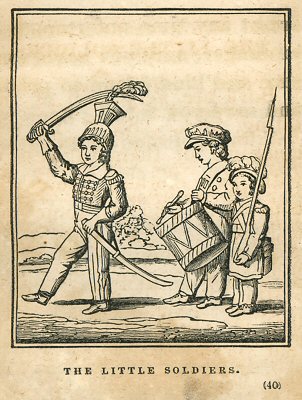
THE LITTLE SOLDIERS.
-----
p. 41
THE LITTLE SOLDIERS.
Boys are very fond of imitating men. So it is very common for them to dress up with gay clothes, some with caps on their heads, some with wooden swords, some with wooden guns, and one with a kettle for a drum; and then they march about, and imagine that they make a fine display. Just look at the picture, and
-----
p. 42
see how smart those three little fellows feel!
This is all very pleasant, certainly. But it is quite another thing to be a real soldier, and go to the wars. I have been in the wars myself, and let me tell you, it is a pleasant matter to talk about when it is all over; but it is not very agreeable to go into a battle.
I suppose you do n’t know what a battle is. I will tell you. Two armies come to-
-----
p. 43
gether in a field. An army is a great many soldiers, some on horses and some on foot. Some have guns, and some have swords, and some have cannon. Well, the two armies are led by men with tall feathers in their hats. The two armies come near together, and fire their guns at each other.
Then the field is covered with smoke; the guns flash and roar; the horses rush across the field; the drums beat, the
-----
p. 44
fifes scream, the bullets whistle, and the soldiers fall to the ground, some of them wounded, and some of them dead!
At length, one of the armies is beaten, and they go away from the field. The other army remains. Oh, what sad sights are to be seen where a battle has been bough! The poor soldiers lie scattered over the field, some of them already dead, and some of them dying. The ground is torn with the
-----
p. 45
cannon shot, the trees are cut and shattered by the bullets, the sod is crushed by the hoofs of the horses, and the grass is stained with blood.
This is a very sad story I am telling you; and I am sorry men ever go to war. But wicked men will sometimes do wrong, and good men are therefore sometimes obliged to defend themselves. But little boys, with wooden swords and wooden guns, have no idea of
-----
p. 46
hurting each other. With them, being soldiers is all a matter of sport. And I sincerely hope none of you, my little readers, will ever have occasion to see a real battle.
I will now tell you a story of a little boy who was found on the field after a battle. He was about four years old; and a very handsome boy he was. He said his name was Henry; and he had a gold chain around his neck; but he could not tell
-----
p. 47
where he came from, or who was his father. He cried piteously for his father and mother, but none could tell him where they were. It was believed that his father had been killed in the battle. So one of the captains took the little boy with him, and had him taken good care of.
Little Henry grew up to be a young man, and he became a soldier. He was then sent to the wars with some other
-----
p. 48
soldiers. At length a battle came on. Henry was at first afraid, but he soon gained courage. He fought bravely. The two armies came close together. The men struggled with each other. But poor Henry was wounded, and he fell senseless upon the ground.
At length, Henry awoke. He was in a room, and not on the battle ground, as he thought; and a kind woman sat watching by him. There was also
-----
p. 49
a man by his side, who looked at him with great interest. Now who do you think these people were? I will tell you. They were the father and mother of Henry.
I suppose you wonder how they found out their son. This also I will tell you. Henry lay wounded on the field. Henry’s mother was going by, and she saw the gold chain around Henry’s neck. She knew the chain, and thus discovered her son.
-----
p. 50
But pray how did Henry get lost when he was a boy? His father lived near the field of battle. He went out to fight, and left Henry at home. His mother was sick, and Henry wandered to the battle field. His father was wounded; his mother was carried away; and the little boy was thus left to wander, and he got lost. His parents did not hear of him, and thought him dead.
I need not tell you how hap-
-----
p. 51
py Henry was to find his father and mother. He soon got well of his wounds, and when his parents came to be old people, he was very kind to them, and seemed as happy in taking care of them, and in endeavoring to make them comfortable, as they could have been in taking care of him when a child.
So I have finished my story, and you must let me go. Good bye.
-----
p. 52
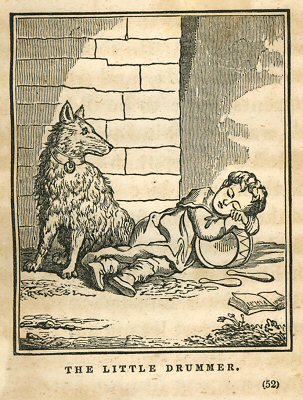
THE LITTLE DRUMMER.
-----
p. 53
THE LITTLE DRUMMER.
I will tell you now about the little Drummer. But you must in the first place look at the picture of him, asleep on his drum, and his dog sitting up like a judge at his side. The picture is on the opposite page.
Here the little Drummer lies,
With his head on his drum;
-----
p. 54
He has closed his sleepy eyes,
And his prattling mouth is dumb.
All the morning he has beat
His drum, and marched about,
Till his busy little feet
Are quite tired out.
Now the grass is his bed,
And his pillow is a drum;
But his weary little head
Finds it sweeter than a plum.
-----
p. 55
The dog sits watching by,
Looking very wise and crank;
But he keeps a careful eye
On his little master, Frank.
If another dog should dare
To disturb his quiet doze,
Tray would surely pull his hair,
And perhaps pull his nose.
For a faithful dog is Tray,
And he loves his little friend;
And when others are away,
He is present to defend.
-----
p. 56
One day this little child,
Who on his drum reposes,
Along the stream was wiled,
By the butterflies and roses.
The flashing brook was bright,
And like a mirror seemed,
And in its waters bright
The mimic roses beamed.
Now his little hand he dipped,
To catch the roses gay,
And wondered that they slipped
From his fingers all away.
-----
p. 57
Then he struck the waters blue,
And laughed to see the bubbles;
And the pleasant moments flew,
Without cares or troubles.
But delusive was his joy,
As the mock roses’ beam;
For the thoughtless little boy
Fell deeply in the stream!
Like an arrow from the boy,
Tray sprang from the bank,
And swiftly plunged below,
To save little Frank!
-----
p. 58
A moment passed away,
And the ruffled waves subside;
Then bravely rises Tray,
With his burthen on the tide!
Now he swims to the shore,
With the poor dripping boy,
And the danger all o’er,
Tray leaps about for joy.
For a faithful dog is Tray,
And he loves his little friend
And when others are away,
He is present to defend.
-----
p. 59
Do n’t you think Tray was an excellent dog? He was so, indeed, and little Frank was very kind to him. The poor boy would have been drowned, if Tray had not jumped into the water and pulled him out.
I hope you like this story of the little drummer and his dog; but as it is a short story, I will tell you a story about a lion. Over the leaf is a picture of a lion. See how bold he looks.
The lion is a very strong
-----
p. 60
animal; and when angry, he is terrible. He roams about in the woods, and when hungry,

he will spring upon a horse and tear him to pieces. Sometimes the lion roars very loud, and his voice sounds fearfully through the forest.
But the lion has some noble
-----
p. 61
qualities. When a person has been kind to him, he is said to remember it and be grateful for it. I will tell you a curious story about a lion.
There was once a man who treated his servant, or slave, so cruelly, that he ran away into the woods. Afraid of being pursued, he crept into a cavern. This cavern was a lion’s den! The lion came towards the man: the man expected instantly to be torn in pieces: but it was not so.
-----
p. 62
The lion’s foot was wounded and bloody. The lion held up his foot to the man, and moaned, as if asking his assistance. The man took hold of the lion’s foot, and found a large thorn in it. It was the thorn which had wounded the lion’s foot. The man drew out the thorn; and the lion, finding his foot much easier, seemed very good-natured and pleasant. He lay down by the man and went to sleep.
-----
p. 63
The man lived in the woods a good while, with the lion; and the lion always treated the man kindly, and brought food to him in his den. But at length the man left the den, and went back to the place he came from.
The man was soon discovered, and carried to his former master. His master was very angry because he ran away. He ordered him to be thrown into a place where there was a
-----
p. 64
great lion, just brought from the woods. It was expected that the lion would immediately kill the man. But instead of killing him, the lion fell down at the man’s feet like a kitten; and the man discovered that it was the same lion from whose foot he had pulled out the thorn!
Thus, you see, the lion remembered his friend, and showed kind feelings towards him. This was what is called gra-
-----
p. 65
titude. I should not like to have my little readers growl and roar like a lion, but hope they will imitate his gratitude, and always show amiable feelings to those who have been kind to them.
-----
p. 66
THE LITTLE PRISONERS.
THERE were once three little children shut up in a closet, for bad behavior.
The girl had been idle and neglected to get her lesson; one of the boys had shown ill temper; and the other, I am sorry to say, had been guilty of the meanest of all crimes: he had told a falsehood! So they were all shut up together.
-----
p. 67
The girl and one of the boys had pieces of paper tied to their heads, called asses’ ears; the other boy had a board fastened to his neck, on which was written, Rogue.
Now, would you not think that when children have been naughty, and when they have been shut up for being so, they would be sorry, and avoid doing wrong any more? But it is not always so. Children who do wrong in one thing are
-----
p. 68
very apt to do wrong in others. Little girls who will neglect their lessons, and boys who will show ill-nature, or tell fibs, will not hesitate to steal sweetmeats when they get an opportunity.
Now it happened, that in the room where these children were shut up there were some sweetmeats. So one took off his shoes and stood upon the back of another, and reached upon the shelf, and got some
-----
p. 69
marmalade, and raspberry-jam, and other things, and fell to eating them.
Oh, you thoughtless children! this may seem very pleasant now, but by and by your parents will discover what you have done, and they will be distressed to find that you have added disobedience to other misconduct!
My dear little readers, Peter Parley is an old man, but he has seen a great deal of the
-----
p. 70
world. He has seen a great many children; some of them good and some of them bad. And let him tell you, that he has never seen disobedient children go unpunished. Sooner or later they are made unhappy for their disobedience.
Let me tell all children another thing. Be they were they may, there is a Being who sees them. They may be alone in a room; they may be by themselves in a street, or a
-----
p. 71
field; it may be night, or it may be day; it is all the same. That Being sees what they do; he hears what they say; he knows what they think. He remembers it all. The good children he approves and loves; the bad children he does not love.
If any child has been bad, let him be sincerely sorry for it, and then go to his father or mother and confess what he has done that is wrong, and let
-----
p. 72
him to do so no more. He will then be forgiven by his parents; he will be loved by them, and by that good Being who dwells in heaven.
I once knew a man who had several children. He sent them to a very good school, where they had all an opportunity of learning alike. Among them was a little girl, who was very idle, and neglected to learn her lessons. She was very much like the little girl in the
-----
p. 73
story who eat the currant jelly.
Now one day there came to the place where this man lived a showman with an elephant, a lion, a tiger, and various other animals. All the children wanted exceedingly to go and see them. Their father promised that all should go who could tell what countries these several animals came from. Accordingly, he examined them separately, and
-----
p. 74
having learnt their lessons well at school, they could tell where they came from, readily, all except the idle little girl. She had neglected her lessons at school, and therefore could not tell where the animals came from. Her idleness was thus discovered, and she was not permitted to go with her brothers and sisters to see the animals. She was very much disappointed, and was in this manner punished for her neg-
-----
p. 75
ligence and idleness. It is in some such way that the idleness or disobedience of children is usually punished.
There was a poor man in Boston who had two sons. One was amiable and kind in his disposition; the other was ill-natured and passionate. The former was beloved, the latter was not beloved. The former was taken into a store and became a merchant, and was at length a wealthy and hap-
-----
p. 76
py man; the other grew up a quarrelsome and turbulent young man, and finally he lost his life in a duel.
Oh, my little readers, beware of indulging ill-temper, for you cannot tell to what evils it may at some future time expose you! How much more beloved, and how much more happy will you be, if you are pleasant and amiable; how unhappy will you be if you are sulky, ill-natured, or passionate.
-----
p. 77
I knew a little boy when I was young by the name of Ralph. His mother once gave him a looking-glass to carry to a shop to be repaired. He was careless, and broke it. He was afraid to confess that he was careless, so he told a lie, and said to his mother that a man ran against him, and knocked the looking-glass out of his hand.
This was the first falsehood that Ralph ever told. But as
-----
p. 78
he succeeded in deceiving his mother in this instance, he tried it again, and by degrees he became a sad teller of falsehoods.
Now one crime is seldom practised alone. A person who will do one wicked thing, will be likely to do others. So it was with Ralph; from telling falsehoods, he at length ventured to steal. At first he took only trifles; but when he grew to be a man he stole greater things. He was at length de-
-----
p. 79
tected, and was thrown into prison, and made to work very hard for many years. At length he died in prison.
I tell my little hearers these sad things, for I wish to warn them against all that is bad and dangerous. Let them never, like the children in the picture, be idle or ill-tempered, or tell falsehoods. Let them rather be good children in all respects, and they will then be loved and happy. If they have
-----
p. 80
ever been wicked, let them confess it frankly, and do so no more, and they will be forgiven.
-----
p. 81
THE MOCKING BIRD.
Now, I will tell you of little Edward and his bird; but before I commence, just look at the picture on the opposite page.
See! the little mocking bird is dead! He lies upon the cage, and Edward is crying by the side of him. Oh! who could have been so cruel as to kill the innocent bird! He
-----
p. 82
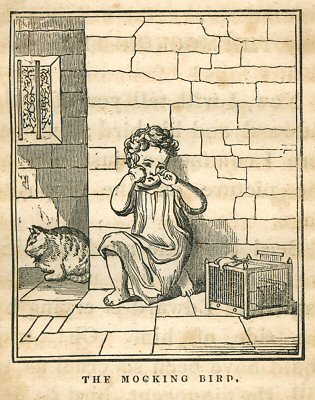
THE MOCKING BIRD.
-----
p. 83
injured no one, but sang all the day, and delighted all who heard him by his sweet songs.
He would imitate all the other birds, and often sing their own songs more sweetly than they. He would, at one moment, sing like the robin, and then like the canary bird; now he would repeat the notes of the meadow lark, and then imitate the lively little wren. Sometimes he would catch the air of a flute, and trill forth the
-----
p. 84
notes with a sweetness and accuracy quite astonishing.
Oh, who could have killed this delightful little singer? I will tell you. Do you see that cat that sits so quietly in the door? How innocent she looks! But let me tell you, that puss is a sly deceiver. She killed the mocking bird! Puss has no taste for music. She would as soon kill a mocking bird as a rat.
Poor bird! Little Edward
-----
p. 85
had fed him, and gone to bed. The little bird, too, was asleep, for it was night, when puss came along on tiptoe and peeped into the cage. She saw the little bird sitting on his roost. She twirled the smellers on her nose, and gently put her paw into the cage. She then spread out her sharp crooked claws, and with a violent blow she clutched the bird in her paws.
He screamed with all his might—but puss had no mercy.
-----
p. 86
She pulled him forcibly between the wires of the cage, and stuck her sharp teeth through his breast!
In the morning, Edward came down, and went to see his mocking bird. What was his grief and surprise to find him dead! Look at the boy in the picture, and see how distressed he seems to be!
For a long time Edward would not be consoled for the loss of his bird. He could not endure
-----
p. 87
the sight of the cat that killed it. But Edward’s father made a little song about the bird, and Edward learned it by heart, and at length, in repeating the song, he forgot the loss of his mocking bird. Here is the song that Edward’s father made for him. My little readers can learn it by heart if they choose.
The little mocking bird
Sang sweetly all the day,
-----
p. 88
And from his wiry cage,
Thus the singer seemed to say:
Come all my little friends
Who love the air so well,
And listen to the tale
Of a prisoner in his cell.
Ye robins and ye larks!
I was once free as you,
And delighted o’er the lawn,
On my swift wings I flew.
At the opening of the dawn,
At the sinking of the day,
-----
p. 89
From the tree’s topmost bough,
I poured forth my lay.
Then other birds were near,
And they listened to my powers;
And joyous was my breast
In those dear bright hours.
With other birds I roved
From the valley to the hill,
From the forest to the lawn,
At the prompting of my will.
Now I glanced through the air
Like an arrow from the string,
-----
p. 90
Now I shook the orchard flowers
With the breathing of my wing.
But my liberty is fled,
And those happy days are gone,
And a prisoner here I dwell,
Broken-hearted and alone.
My friends are all away,
Far, far o’er the lea,
And they cannot hear my call,
Or set the prisoner free.
Oh! nought is left to me,
But to sing my weary lay,
-----
p. 91
And seek to hide my grief,
By singing all the day.
I have now told you about little Edward and his mocking bird. I shall tell you some more stories when I meet you again. Good bye!
-----
p. 92
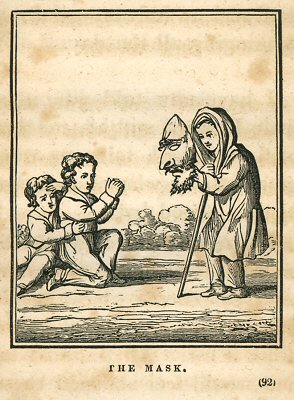
THE MASK.
-----
p. 93
THE MASK.
I will tell you some more stories with pleasure. Now look at the picture and tell me what you see. There are two little boys, who appear very much frightened at a terrible looking fellow who is coming towards them. No wonder they are so terrified; do you think it is? Why, almost any one would feel alarmed to see
-----
p. 94
such a monster, with a face like a giant, and such a nose and beard.
But let us look a little nearer. Who is this little fellow laughing behind the old man’s face at his companions? Why, it is no one but little Henry, after all. He has got a mask on, and is mightily amused to think himself of so much importance. I do n’t think they would have run if they had known who it was.
-----
p. 95
Did you ever see a mask? I dare say not. Masks are artificial faces. They are generally ugly, and have large noses, or big eyes, or large chins. Now, in some countries these masks are very common, and you can see some of them in the shop windows of Boston.
In France, a country far to the east, masks are used for Christmas, and other frolics. At such times the people come together in large parties. Some-
-----
p. 96
times they all have masks on. They look singular enough, I can tell you. Some look like kings, and some like countrymen. Some are dressed like Turks, some like Greeks, and some like North-American Indians.
The boys and girls have their parties too, and try to imitate grown-up men and women. One little fellow tries to imitate Caesar; another Alexander the Great. One tries to look like
-----
p. 97
Gen. Washington; another like Gen. La Fayette.
One girl carries a sceptre, and acts the part of Queen Elizabeth. Elizabeth was queen of England. One of the company is dressed like a musician, and carries a violin. So when they are all ready, he begins to play; the rest begin to dance.
In this way the little party amuse themselves. At last they grow tired of dancing. They take off their masks, and
-----
p. 98
set themselves in a circle, and each one tells a story. I will tell you one of these stories, which perhaps you have not heard. It is about a dog and his master.
There was once a French merchant, who went a journey, accompanied by his faithful dog. He went this journey to get some money that another man owed him. He was fortunate, and obtained the money which he went for. He took it
-----
p. 99
and put it in his bag. He then returned towards his home. After he had rode some distance he grew tired. So he dismounted from his horse, and took off the bag containing the money. This he placed under his head for a pillow, and fell asleep.
When he awoke, he rose and mounted his horse. He forgot entirely that he had left his bag with the money in it under the hedge, where he had been
-----
p. 100
sleeping. But his dog, who sat by and watched his master, saw that he had left the bag.
The dog could not speak. If he had been able to speak, he would have told his master that he was leaving his money behind him. So he first tried to take the bag and carry it in his mouth. Try as hard as he would, he could not move it. As a last resort he tried to excite the notice of his master.
-----
p. 101
He ran after him, barking and howling, and biting his horse’s heels. His master had never seen him act in this manner before. He began to be afraid of his dog, and at last thought he was mad. When he saw that he did not stop at any of the brooks to drink, as he commonly did, he became certain; for mad dogs, you know, are very much afraid of water.
So he drew his pistol to shoot the faithful animal which had
-----
p. 102
served him many years. He felt very bad to kill the poor creature; but he thought it his duty. He fired, and the dog fell.
He tried to crawl towards his ungrateful master, but his master could not bear the sight, and hastened from the spot.
As he pursued his journey, he could not help reflecting upon his expiring favorite. He exclaimed to himself, “I had rather have lost my money than
-----
p. 103
so affectionate a dog;” when, stretching out his hand as if to grasp the treasure, he found that it was gone.
He saw the truth at once. “What a wretch have I been!” said he. “Poor, faithful creature! how have I rewarded thy fidelity!” He hastened back to the hedge where he had left his treasure. Here he found his faithful dog. He was seated by the side of his master’s bundle. He wagged his tail,
-----
p. 104
licked his master’s hand, and giving a low growl of affectionate recognition, expired.
Several other affecting stories were told by the little masking party. They then bid each other good night, and retired to rest. Good bye.
-----
p. 105
THE LITTLE SAILOR.
Well, here you see are some little folks playing by the side of a pond. There is one boy whose name is Thomas. Then there is his little sister by his side. Her name is Susan. There is another person with a stick in her hand. This is their older sister, Jane, who is so kind as to go with them, and amuse them.
-----
p. 106
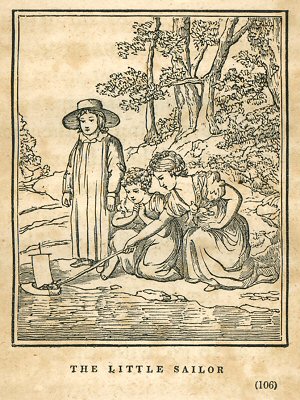
THE LITTLE SAILOR
-----
p. 107
Yes, see, they have got a little boat, with a paper sail, and a little wooden man for a sailor. Now, what do you think that boat is? It is a wooden shoe! In this country we wear leather shoes; but in some other countries they wear shoes of wood. It makes a smart boat, do n’t it?
The sailing of boats in ponds is a very amusing thing; but children should not try such kind of play, unless they have some
-----
p. 108
one to take care of them, as this little boy and girl have.
I once heard of a boy; he was sailing a little boat, made of a chip, by the side of a pond. His foot slipped, and he fell into the water. He had a dog. The dog’s name was Trip. Trip caught hold of his little master, and pulled him out of the water. If Trip had not been there he would have been drowned.
But I have known some boys
-----
p. 109
who have gone in large boats, called ships, such as they go to Europe in, and to Asia, and Africa. Some of these ships are very large; and one of them will hold two hundred men. You remember I have told you about a little soldier. I will now tell you about a little sailor. His name was Thomas; perhaps the same Thomas that you see represented in the picture. Little Thomas was a good boy. He loved his parents and friends,
-----
p. 110
and was beloved by them. Now Thomas had an uncle who was a sailor. He commanded a ship, and had sailed a great many times upon the ocean. He told Thomas what he had seen upon the ocean, and Thomas wanted to go with him. So he asked his parents, and they said he might go. The vessel sailed for China. When you come to study geography, you will learn where China is situated. Now, Thomas saw
-----
p. 111
a great many wonderful things while he was going to China. Perhaps you would like to have me tell you some things that Thomas saw. Well, I will tell you some.
On the ocean he saw a whale playing in the water. Though the whale was as large as a house, it moved very swiftly and very easily. It was strong enough to destroy the largest vessel. But it never did any harm, unless provoked or in-
-----
p. 112
jured. By and by he saw the little whale-boat creeping towards the whale. It looked like a speck by the side of the monster. The whale did not notice the boat; if he had, he could very easily have rolled over and sunk the men and the boat in the ocean. One of the men in the boat had a long spear in his hand, called a harpoon. The harpoon had a rope tied to it. This sharp instrument he stuck into the whale. The whale
-----
p. 113
tried very hard to get away, but the men held fast to the rope, and so the whale was taken and killed. People get oil from whales, such as we burn in our lamps. When you see this oil you will recollect about the
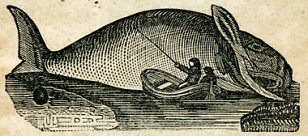
whale. Here is a picture of a whale.
Thomas also saw some other
-----
p. 114
curious things while he was going to China. He saw a great serpent, or snake, call-
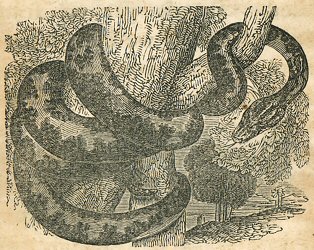
ed the anaconda. This snake is not like one of our snakes;
-----
p. 115
it is as long as a tree, and when it is quiet it looks very much like a large log. Above is a picture of an anaconda. When it is hungry it will sometimes eat large animals as big as deer. The people are very much afraid of the anacondas; but they sometimes are able to kill them. When you get old enough to study natural history, you will learn where these snakes and other curious animals are found.
-----
p. 116
Thomas at last came to China. I have not time to tell you all the things that he saw in China. But I will tell you one thing. He learned how they get tea. Tea is nothing but the leaf of a shrub; it grows like the leaf of a peach tree or pear tree. The people pick these leaves and dry them, and put them in boxes. These leaves are brought to his country in boxes, and we buy them. This is the way we get our tea. When
-----
p. 117
you come to study botany you will learn all about these things. Thomas staid in China a long time, but at last he returned home to Boston. He had grown a great deal; so much that his father and mother did not know at first that it was Thomas. He told them that it was their son Thomas, and then he told them all that he had seen. They were very glad to find that he had improved so much. Thomas made a good match, and at
-----
p. 118
last became Captain Thomas. But we have got to the end of our walk. So, good bye.
-----
p. 119
A WINTER STORY.
What, more stories still? I thought you was tired of my talking to you: but as you wish me to go on, I will tell you a winter tale.
You have heard of such a state as Vermont. It is about one hundred miles from Boston. It is a beautiful country, with many mountains, and streams, and forests.
-----
p. 120
Many of the forests are of evergreen trees, so that they are handsome even in winter. Among these trees there are many birds and four-footed beasts. There are quails, partridges and owls; and there are squirrels, rabbits, foxes, lynxes, deer, and bears. These creatures live in the woods through the winter.
Well, many years ago, there was a man named Bennett, who lived among the mountains of
-----
p. 121
Vermont. He had a small house made of logs, and a wife, with three children. There was no town, and no other house, within several miles.
His house was in a little valley between two tall mountains. He had cleared away the forest around his house, and there he raised corn and potatoes, for his family and his pigs, and grass, for his cow and his sheep.
In summer he lived very
-----
p. 122
pleasantly, for then he could roam freely over the mountains, work on his little farm, and catch trout with his hook, in the streams. But when winter came, the snow fell so deep in the valley as almost to bury up his little brown house.
However, at such times he would dig away the snow to his barn, feed his cow, and sheep, and pigs: and as there were plenty of trees around, he cut them down, and piled up
-----
p. 123
the wood, and kept good roaring fires in his house. So he usually passed the winter very pleasantly.
His wife was a nice pleasant woman, and his three children were very good; and so, during the long winter evenings, they would all get round the great blazing fire, and read or tell stories.
So Mr. Bennett and his family dwelt happily for many years in this mountain retreat.
-----
p. 124
But at length a strange event happened.
In the autumn, Mr. Bennett used to take his gun and go upon the mountains, to shoot squirrels, and partridges, and quails. Well, one day, about the end of November, of a mild morning, he took his gun and went upon the mountains to shoot some game. For a long time he found nothing, and so he went to a great distance. Here at length he found an
-----
p. 125
abundance of squirrels, and so he kept shooting them till near night. He then set out to go home.
Unhappily, he took the wrong course, and so got lost in the woods. Still he kept going along, as fast as he could, thinking all the time he was going the right way. But alas, he was only going farther and farther from home. Thus he wandered on all night.
In the morning it was very
-----
p. 126
cloudy, and pretty soon it began to snow. At first the snow flakes fell softly like feathers, but by and by the wind began to blow, and the snow came swift and slanting over the tops of the tall mountains.
Mr. Bennett now began to be alarmed. He found out that he was lost, and could not tell which way to go. All around was mountains, rocks and forests. Still he kept on till night. He then was so
-----
p. 127
tired that he could go no farther. So he crept into a hole between the rocks, where he made a fire of sticks, and roasted one of his squirrels, for supper.
All night it continued to snow very fast. The wind roared in the tree-tops, and the branches creaked, and the owls hooted, and the wolves howled. But Mr. Bennett was a stout-hearted man, and did not fear any of these things.
-----
p. 128
In the morning the scene around was very dreary. The snow was two feet deep, and still continued to fall very fast. He therefore remained all day in his cell, between the rocks. The next day the storm ceased, but the snow was fully six feet deep. Mr. Bennett however determined to make an effort to find his home.
So he left his retreat in the rock, but he soon found it impossible to proceed. The snow
-----
p. 129
was so deep as to be above his head, and often he pitched down between the rocks, so as to be completely buried. After having struggled on for half a day, he at length got back to his cave.
His situation was now very sad. Winter had just begun; he was lost in the wilderness, away from his home and his family: how far he knew not; nor did he know in what direction. The snow was very
-----
p. 130
deep, and he could not expect it to disappear before the spring. What then was he to do? Was he to stay here all winter, alone, with no bed but the rock, no home but a cave, no food but the bark of the birch trees around, or now and then a squirrel or a partridge that perchance he might shoot?
These sad thoughts came to his mind, but others still more sad disturbed him. What would become of his family? Alas,
-----
p. 131
thought he, they will all perish: they are alone, unprotected, and unprovided with food and fuel. They must perish, and I shall never see them more! Even if I am able to live through the winter, when I get back to my little hut, I shall only find their bones!
Such were his mournful thoughts as he lay in his cave, day after day and night after night. But by and by he was called to other troubles. His
-----
p. 132
squirrels that he had shot were now all gone, and he had not seen a living thing in the woods around. He was therefore in a very bad situation.
Beside this, the weather was now excessively cold. Almost every day the snow continued to fall, until at length it was seven or eight feet deep, on a level. He therefore could not go far from his cave. He spent his time in making this as comfortable as possible, but at
-----
p. 133
best it was a cold and comfortless dwelling.
Thus a month passed; and now the poor prisoner had nothing to eat but the bark and twigs of birch trees. On these he subsisted for a week, but his hunger was so great that he wished he could die. One night, about this time, he was asleep in his cave. He dreamed of his home. He thought he had found it, and was restored to his family. He imagin-
-----
p. 134
ed that he was seated at the table by the side of his wife; that around it were his children, and before him a delicious feast of deer’s flesh.
How happy was the poor man in his dream. But, alas! it was only a dream. He started, and though he heard some one scream! How desolate were his feelings, on waking, to find himself still the dreary exile of the rock! As he gazed about to recollect his senses, he
-----
p. 135
again thought he heard a scream. He listened, and went to the mouth or door of his cave.
Here he heard distinctly a cry like a human voice. At first it seemed distant, and then more near. He looked upon a tree, and there he saw an owl. The creature seemed to be looking at him, and wailing with a loud and frightful cry, as if to warn him of danger. While the poor man was gazing
-----
p. 136
at the owl with a feeling of awe, he heard a sound at a little distance. He looked and saw a large black beast wallowing through the snow. It was moonlight, and he could see the creature pretty well. More than half the time it was buried in the snow, but he had no great difficulty in seeing that it was a bear.
Many people might have been frightened, for the shaggy monster was coming directly
-----
p. 137
toward the cave. But Bennett was not easily scared. He got his gun, knelt down at the mouth of his cave, and fixing his eye on the beast, waited his approach. At length he came pretty near; he saw Bennett on his knees. The bear was never more astonished in his life. He did not expect to see a man there, at that time of night, and in the dead of winter. He supposed himself king of the forest. He looked
-----
p. 138
again at the man: his eyes glared, and he began to grow very angry. He uttered a rough growl. Bennett slowly lifted the breech of his gun to his eye; he put his finger to the lock. Whang! went the gun. Whang! whang! whang! said forty echoes among the mountains. Hoot, hoot, hoot! said the owl. Yah! said the bear. I guess you’ve got it, old fellow! said Bennett: and true enough the bear was dead.
-----
p. 139
So our poor hero was very fortunate. The bear was good food, and served to feed him for nearly four weeks. Beside this, his skin made a fine great coat, which Bennett wanted very much.
When the flesh of the bear was about gone, and Bennett began to be again afraid of starvation, he chanced to be sitting at the door of his rock. It was morning, and at a long distance he saw a deer coming down the side
-----
p. 140
of the mountain. He came at long bounds, but was nearly buried in the snow at every leap. Pretty soon, a wolf was seen following him, and then another and another. These pursued him like hounds, uttering frequently a sharp barking cry.
The deer floundered on and the wolves pursued. The poor creature was very tired; he held out his tongue, and made a sort of whistling cry, and
-----
p. 141
once in a while looked back in terror. At length he suddenly turned and came directly toward the cave. Bennett took a straight aim, as he appeared, fired, and the deer fell. The wolves came up, and seemed to think the deer belonged to them. Bennett thought it was his: so a fierce dispute followed. The wolves barked, howled and snapped; Bennett shouted, thumped, and told the rascals to get away. But they would not.
-----
p. 142
till at length he knocked one of them down with the butt-end of his gun; when the rest ran off.
Thus you see our exile of the forest was again supplied with food. Nor was this all; the wolf, after a little while, showed signs of life. Bennett took care of him, and he gradually began to get well and to like Bennett very much. The latter was so solitary, that even the society of the wolf was
-----
p. 143
pleasant. So he took pains to please him, and pretty soon the creature ceased to growl, and grew gentle, and played with his master’s hand, and fawned upon him like a dog.
Bennett had fastened him at first by twisting around his neck a small sapling, but now he let him go loose, and the creature remained at home like a dog. Sometimes he would go a little distance, but after a short time he would come back.
In this manner the two friends remained till the end of March. The weather now began to change. The bitter frosts ceased, the snow melted, and a soft southerly breeze came sighing among the hills. The rivers began to leap and run down the steeps; huge masses of snow tumbled from the cliffs, and fell thundering to the bottoms of the valleys.
Bennett and his wolf now left their prison. They mounted to the top of the highest mountain. Afar off, at the distance of thirty or forty miles, Bennett thought he could see the tall peaked mountain, at the foot of which his home was situated.
He set off toward it. He traveled two days, sometimes overwhelmed with the sliding masses of snow,
-----
p. 144
and sometimes swept away by the furious torrents that foamed and fretted down the mountain slopes. After two days, he reached the top of the mountain. He looked down, and saw his little brown house, in the deep valley beneath. There it stood—but were his wife, his children, there? Were they alive? Should he find them there, safe and well, and happy at his return? or should he only find their moulding forms?
With an anxious heart he descended the mountain. As he approached his house, he saw his cow grazing on the hill-side; the pig was rooting in the field; the children were playing before the door, and his wife was looking out the window.
At first they were afraid of the wolf and the bearskin great coat, but they were soon reconciled to them, and all were once more happy together.